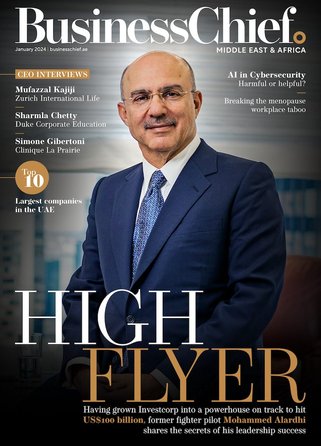Five causes of workplace stress and how to tackle them

Employees are stretched and stressed like never before.
According to the Gallup State of the Global Workplace 2023 Report, worker stress is at an all-time high.
While other issues related to the pandemic have subsided, stress continues to rise with 45% of employees in the Middle East region saying they experience stress at work, higher than the globel average. Turkey topped the regional list for stress at 68%.
A serious workplace issue for both employee and employer, stress can lead to employee burnout – which in turn leads to falling productivity and engagement and ultimately to employees quitting.
In the UAE, for example, at least 61% of employees said they were not engaged (quiet quitting) or essentially doing the bare minimum, on par with the global average.
Gallup estimates that low engagement at work costs the global economy US$8.8 trillion and accounts for 9% of GDP – but argues ‘quiet quitters’ can be easily engaged again with improved management.
So, what action can business leaders do to mitigate rising stress levels?
Here, we talk to HR directors and career coaches to discover the main causes of workplace stress and how each can be addressed.
Stress caused by dissatisfaction
Often stress arises when employees feel that they aren’t progressing in their jobs, stuck and dissatisfied with what they do. What if employees feel irrelevant or out of place in their organisation?
For Asad Husain, author of Careers Unleashed, employees are likely to feel more fulfilled in their jobs if they can see opportunities to improve their skills and clearly progress, and it's up to businesses to provide these chances.
“People’s education, knowledge, skills, mindset and experience are key to helping them solve problems that businesses have today and tomorrow. With opportunities to improve these, they are more likely to feel fulfilled and equipped to face the challenges of their working day. It's important for people to see they are valued and making meaningful contributions.”
But, Asad believes that individuals also have a role to play: they should consider what it is they value at work. Deducing what they really want from their job can help reduce the stress or discontentment they feel.
“For the employee, understanding one’s career aspirations and the work values accompanying it is critical to enable a better and happier life”, he says. “If you tailor your job to reflect these values, the work you do will become much more fulfilling and probably less stressful".
Stress caused by overwhelm
Professionals frequently find themselves with an endless list of admin-based tasks to manage alongside the core aspect of their job. With so many competing demands, it can be stressful to actually make headway with any of their main responsibilities.
Kathy Soulsby, author of How To Work With A Virtual Assistant, explains how outsourcing admin and peripheral tasks can lighten the load for individuals, and allow them to focus on their true purpose. For her, decisions like choosing to bring on a Virtual Assistant (VA) is the ultimate stress-saving solution.
“A good VA can work alongside you and take your business from frantic to thriving. They can give you time back to do the vital things in your business that you and only you can do”, she says, “They’ll skim off your task list everything that you don’t need to be involved with and probably even help you create and manage that task list so that everyone knows what they are doing and when.”
For those busiest and often in a place of leadership too, delegating and outsourcing to others might be the only way of clearing their plate. Plus, working in a team is likely to reduce individual responsibility and increase opportunity for collaboration. A problem shared is a problem halved.
Stress caused by isolation or misunderstanding
For many employees, feeling out of place can transform the workplace into a very stressful environment. Whether they feel different from their other colleagues due to race, sexuality, gender, or other defining characteristics, businesses must step up and change workplace culture to be more inclusive, open and considerate. These issues are often most keenly felt by minorities and women in the workplace, says Dr Zareen Roohi Ahmed, author of The Gift.
“I have observed the discrimination and stigma many women encounter in their professional lives due to the most natural things, such as menstruation. I believe leaders have the power and responsibility to change such unconscious bias and provide spaces for education and open dialogue”.
However, she suggests it can also be as simple as making small steps to provide free menstrual products in women’s bathrooms for example.
“It is a small yet powerful initiative to foster trust and respect in the workplace," she says. “Talk to your female colleagues, organise a meeting to see what features they would like implementing at work. Just showing interest in women’s welfare at work can go a long way in making the workplace a more welcoming and open environment”.
Stress caused by a difficult team or colleagues
Without good cohesion and communication a team is dysfunctional, and a dysfunctional team can cause a lot of stress for both employees and leaders. Iris Clermont, business consultant and author of Team Rhythm, recommends that it often takes looking outside the typical business world to create systems that iron out workplace clashes and inefficient teams. For her, the world of music is the perfect example of seamless synchronisation, team working, empathy, listening skills and intentional action.
“A good practice for a band is conscious silence before they start a new song”, she says. “Beginning with silence, perhaps a bit longer than usual, raises the attention of all the musicians with the effect that when the song starts, there’s a synchronous rhythm from the first to the last pulse”.
This, she argues, can be replicated in workplace settings, and is best initiated by leaders.
“To align with your team and colleagues, elevate your listening abilities. Speaking less and listening more will enable you as an empowering leader to understand and connect with others on a deeper level. By raising your ability to hear what others are saying, you’ll better recognise their needs, desires and goals, and work together towards achieving them”.
Stress due to lack of motivation or procrastination
Sometimes stress is a driver of productivity and sometimes it has the opposite effect. Procrastination and lack of motivation are common side-effects of stress. So how are they beaten? John Roussot, award-winning business coach and author of Liberate Your Greatness emphasises accountability as the best medicine, and creating a workplace-wide culture of accountability as the ultimate solution.
“While holding yourself accountable is important and a great starting point, it is equally essential to create an environment where others feel encouraged to do the same. Leaders should encourage a culture of accountability within their teams or organisation by promoting open communication, setting clear expectations and providing constructive feedback”.
Often accountability, however uncomfortable, is the needed catalyst for growth and success both as a group and individually.
“By taking ownership of your actions, your decisions and their outcomes, learning from your experiences and fostering a culture of responsibility, you can unlock your full potential to help you achieve greatness”, explains John.
“As leaders, our biggest responsibility is to inspire, encourage and uplift the people we’ve been entrusted to lead.”
Featured Articles
SAP has announced it has appointed a new President for a newly-created EMEA region, aiming to make the most of the opportunities of cloud and AI
technology
From fighter pilot to fashion house financier, Mohammed Alardhi has taken Investcorp to great heights – so what’s the secret to his success?
Dr Omar Al-Attas, Head of Environmental Protection and Regeneration at Red Sea Global, shares his COP28 hopes and approach to regenerative tourism
strategy



